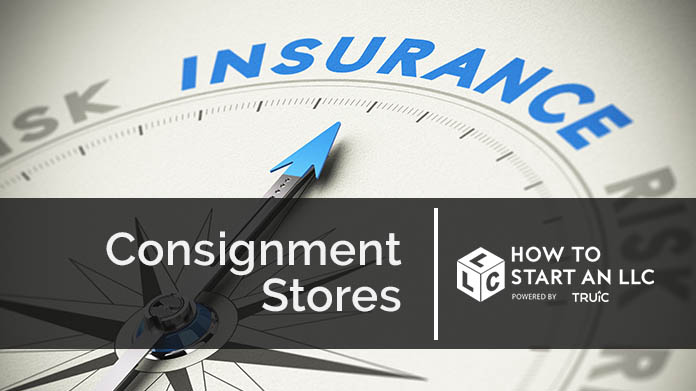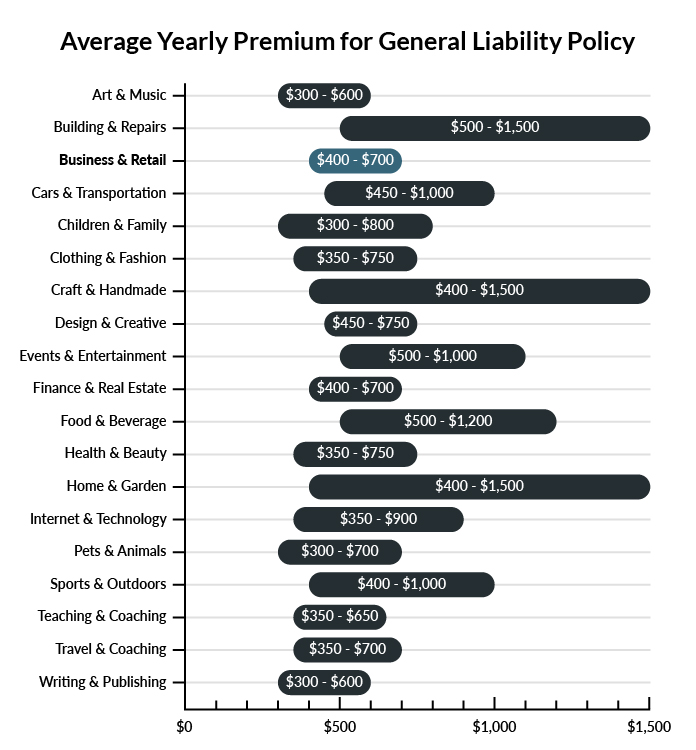Consignment Store Insurance
Getting insurance for your consignment store is essential.
Consignment stores need to be protected against things like negligence, personal injury claims, and breach of contract claims.
For example, a customer or employee is injured on the shop’s premises, or a seller claims that you did not pay them the agreed-upon percentage after their items sold.
We’ll help you find the most personalized and affordable coverage for your unique business.

Recommended: Ergo Next Insurance is dedicated to matching small businesses with the right policy at the best price.
Best Insurance for a Consignment Store
General liability insurance is — generally speaking — one of the most important insurance policies for consignment stores.
Some of the risks general liability insurance covers are:
- Bodily injury
- Property damage
- Medical payments
- Legal defense and judgment
- Personal and advertising injury
Unfortunately, a number of the risks your consignment store could face extend past the jurisdiction of general liability. Therefore, it is common for a number of additional policies to be used:
- Commercial property insurance
- Product liability insurance
- Workers’ compensation insurance
- Professional liability insurance
Insurance providers are generally one of two distinct types. It is important to be aware of the unique approaches to selling insurance used by each of these types:
- Traditional brick-and-mortar insurers — These insurers, such as Nationwide and The Hartford, are based out of a physical location and primarily assist their customers with the help of an insurance agent.
- Online insurers — These insurers, such as Tivly and Ergo Next, run their operations entirely online with the power of AI to be able to offer tailored quotes quickly and conveniently.
Let’s Find the Coverage You Need
The best insurers design exactly the coverage you need at the most affordable price.
Cost of General Liability Insurance
The average consignment store in America spends between $400 – $700 per year for $1 million in general liability coverage.
Compare the average cost of general liability insurance for a consignment store to other professional industries using the graph below.
Several factors will determine the price of your policy. These include your:
- Location
- Deductible
- Number of employees
- Per-occurrence limit
- General aggregate limit
You may be able to acquire general liability insurance at a discounted rate by purchasing it as part of a business owner’s policy (BOP) rather than as a standalone policy.
A BOP is a more comprehensive solution that includes multiple forms of coverage, such as business interruption and property insurance.

Find the Best Rate
Discover the best coverage at the lowest rate in our cheapest business insurance review.
Common Situations That General Liability Insurance May Cover for a Consignment Store
Example 1: A high shelf suddenly collapses on a customer, causing serious injuries. General liability insurance would cover the customer’s medical bills.
Example 2: When a customer trips while entering your store, she breaks an ankle and decides to sue. General liability insurance would pay for your legal fees and any damages awarded in a settlement.
Example 3: A customer drops off several boxes of goods so you can assess their value. An overnight storm creates a leak in your roof and the dripping water ruins the goods, many of which are quite valuable. General liability insurance would pay for the damages to the customer’s property.
Other Types of Coverage Consignment Stores Need
While general liability is the most important type of insurance to have, there are several other forms of coverage you should be aware of. Below are some of the most common types of coverage:
Commercial Property Insurance
You’ve made major investments in your inventory of clothing and accessories. If you own the building in which you operate, you’re responsible for all business-related property housed there in the event of a fire or natural disaster. Commercial property insurance would cover the cost of replacing your inventory after an accident so you can recover quickly.
Product Liability Insurance
When you sell products to the public, there’s always a chance a customer may file a lawsuit if they believe one of your products injured them. Product liability insurance would protect your business by covering your legal fees and any damages awarded in the event of a lawsuit.
Workers’ Compensation Insurance
Most states require businesses to carry workers’ compensation insurance for their part-time and full-time employees. This coverage protects your employees if they become injured at work or fall ill after a work-related accident. It not only covers an employee’s medical bills and lost wages if they need time to recover but also any disability benefits stemming from a work-related accident.
Professional Liability Insurance
If you offer professional advice about the value of the goods your customers bring to your store, it’s possible a customer could sue based on the advice you gave them. Professional liability insurance would cover your legal fees and any payouts awarded in the event of a lawsuit.
Additional Steps To Protect Your Business
Although it’s easy (and essential) to invest in business insurance, it shouldn’t be your only defense.
Here are several things you can do to better protect your consignment store:
- Use legally robust contracts and other business documents. (We offer free templates for some of the most common legal forms.)
- Set up an LLC or corporation to protect your personal assets. (Visit our step-by-step guides to learn how to form an LLC or corporation in your state.)
- Stay up to date with business licensing.
- Maintain your corporate veil.
Consignment Store Insurance FAQ
Yes, absolutely. You will need to first get a quote from an online business insurance provider like Ergo Next Insurance. Ergo Next allows you to then purchase a policy immediately and your coverage will be active within 48 hours.
A typical business owner’s policy includes general liability, business interruption, and commercial property insurance. However, BOPs are often customizable, so your agent may recommend adding professional liability, commercial auto, or other types of coverage to your package depending on your company’s needs.
“Business insurance” is a generic term used to describe many different types of coverage a business may need. General liability insurance, on the other hand, is a specific type of coverage that business owners need to protect their assets.
Due to the risks that your consignment store will face, it is highly recommended that you adequately protect it with business insurance before it starts in almost all cases.
In other scenarios, insurance is not just a recommendation, as your business may be obligated by law to carry specific policies if it satisfies certain criteria.
Not necessarily. Certain exceptions may be written directly into your consignment store insurance policy, and some perils may be entirely uninsurable.
Yes, an LLC is meant to create a legal barrier between your business and your personal assets and credit. If you haven’t formed an LLC yet, use our Form an LLC guide to get started.
An LLC doesn’t protect your business assets from lawsuits and liability– that’s where business insurance comes in. Business insurance helps protect your business from liability and risk.